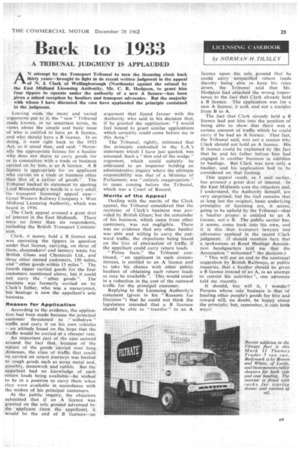Back to 1933
Page 27

If you've noticed an error in this article please click here to report it so we can fix it.
A TRIBUNAL JUDGMENT IS APPLAUDED
A• N attempt by the Transport Tribunal to turn the licensing clock back
thirty years—brought to light in its recent written judgment in the appeal of N. I. Clark of Wellingborough (Northants) against the refusal by the East Midland Licensing Authority, Mr. C. R. Hodgson, to grant him four tippers to operate under the authority of a new A licence—has been given a mixed reception by hauliers and transport advocates. But the majOrity with whom I have discussed the case have applauded the principle contained in the judgment.
Leaving aside the many and varied arguments put to it, the "new" Tribunal made known, in no uncertain terms, its views about the simple and basic issue of who is entitled to have an A licence, and who should have a B licence. In so doing,it went right back to the 1933 Act, as it stood then, and said: "Normally the appropriate licence for a haulier who does not desire to carry goods for or in connection with a trade or business carried on by him, is an A licence. A B licence is appropriate for an applicant who carries on a trade or business other than that of a calrier of goods." The Tribunal backed its statement by quoting Lord Blanesburgh's words in a very adult (intransport licensing) appeal case— Great Western Railway Company v. West Midland Licensing Authority, which was heard in 1936.
The Clark appeal aroused a great deal of interest in the East Midlands. There were no fewer than six respondents, including the• British Transport Commission.
Clark, it seems, held a B licence and was operating the tippers in question under that licence, carrying, on three of them, shoemakers' and tannery waste for British Glues and Chemicals Ltd., and three other named customers, 150 miles,and "other goods within 15 miles". The fourth tipper carried goods for the four customers mentioned above, but it could not carry the "other goods ". The business was formerly carried on by Clark's father, who was a nurseryman, but haulage is now the appellant's sole business,
Reason for Application According to the evidence, the application had been made because the principal customer threatened to withdraw" traffic and carry it on his own vehicles —an attitude based on.the hope that the traffic would be carried at a cheaper rate.
An important part of the case centred around the fact that, because of the nature of the goods carried Over .Iong._ distances, the class oftraffic that could be carried on return journeys was limited to rough goods such as Scrap metal and, possibly, stonework and rubble. But the* appellant had no knowledge of such return loads being available—he wished' to be in a position to carry them when they were available in accordance with the wishes of his principal customers.
At the public inquiry, the objectors submitted that if an A licence was granted on the sole ground advanced by the applicant ,(now the, appellant), it would be the end of B licences—an argument that found favour with the Authority who said in his decision that, if he granted the application: "I would feel bound to grant similar applications which certainly could come before me in this Area."
The Tribunal, rightly, intimated that the principle embodied in the L.A.'s statement which I have just quoted, was unsound. Such a " thin end of the wedge" argument, which could suitably be addressed to an inspector holding an administrative inquiry where the ultimate responsibility was that of a Minister of Parliament, was entirely inappropriate" in cases coming before the Tribunal, which was a Court of Record.
Merits of the Appeal Dealing with the merits of the Clark appeal, the Tribunal -considered that the mainstay of Clark's business was provided by British Glues; but the remainder of his business, which came from other customers, was not negligible. There was no evidence that any other haulier was able and willing to carry the outward traffic, the objections being based on the fear of abstraction of traffic if the appellant could carry return loads.
" Prima facie," the Tribunal continued, "an applicant in such circumstances, is entitled to an A licence and to take his chance with other public hauliers of obtaining such return loads as may be available ". This would result in a reduction in the cost of the outward traffic for the principal customer.
Replying to the Licensing Authority's statement (given in his "Reasons for Decision ") that he could not think the legislature intended that a B licensee should be able to "transfer" to an A




















































































